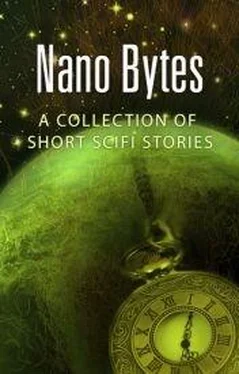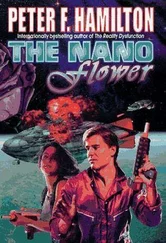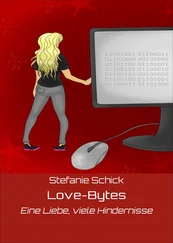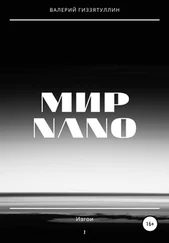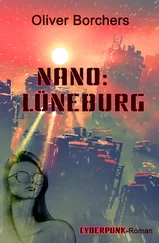AlexMcGilvery Array - Nano Bytes
Здесь есть возможность читать онлайн «AlexMcGilvery Array - Nano Bytes» весь текст электронной книги совершенно бесплатно (целиком полную версию без сокращений). В некоторых случаях можно слушать аудио, скачать через торрент в формате fb2 и присутствует краткое содержание. Жанр: Фантастика и фэнтези, на английском языке. Описание произведения, (предисловие) а так же отзывы посетителей доступны на портале библиотеки ЛибКат.
- Название:Nano Bytes
- Автор:
- Жанр:
- Год:неизвестен
- ISBN:нет данных
- Рейтинг книги:5 / 5. Голосов: 1
-
Избранное:Добавить в избранное
- Отзывы:
-
Ваша оценка:
- 100
- 1
- 2
- 3
- 4
- 5
Nano Bytes: краткое содержание, описание и аннотация
Предлагаем к чтению аннотацию, описание, краткое содержание или предисловие (зависит от того, что написал сам автор книги «Nano Bytes»). Если вы не нашли необходимую информацию о книге — напишите в комментариях, мы постараемся отыскать её.
Nano Bytes — читать онлайн бесплатно полную книгу (весь текст) целиком
Ниже представлен текст книги, разбитый по страницам. Система сохранения места последней прочитанной страницы, позволяет с удобством читать онлайн бесплатно книгу «Nano Bytes», без необходимости каждый раз заново искать на чём Вы остановились. Поставьте закладку, и сможете в любой момент перейти на страницу, на которой закончили чтение.
Интервал:
Закладка:
The heartbeat indicator began to spike erratically. With a smile the clone ran and leapt into the waiting fastship. As the sentinels burst in the fastship soared away, a flare of light in the morning sky.
PaulLev Synchronicity
It’s been this way all of my life. Like when I was in high school, and we’d be reading our homework assignments out loud, and some kid would stand up right before me and read pretty much what I had written. Not that he’d cheated or anything. I never showed my work to anyone. And yet he’d written my ideas, even using my words. I had a hard time proving that I wasn’t the cheat. «Great minds think alike,” the more enlightened among my teachers would say. But that was too pat. I knew something else was going on‑I just didn’t know what.
It happened on the radio, too. I’d be singing a song, driving somewhere, and I turn on the radio and that very same song was playing. Yeah, I know that they played the Beatles a lot back then - still do on the oldies stations I listen to - but I mean, the Beatles have a pretty big catalog. What was the likelihood that «Dr. Robert» was on the radio right after I’d been singing it?
When I got to college and grad school, I began to search for similar patterns in history. There were plenty. Alexander Graham Bell and Elisha Gray invented the telephone, independently, at the same time. Pretty much the same for motion pictures - invented independently by Edison in the U. S., Friese—Greene in England, and the Lumiere Bros in Paris. And of course Wallace came up with a theory of natural selection all on his own, at the same time as Darwin.
I was starting to put together a dissertation proposal on this very topic, when I came across an article published in an obscure journal — «On the Ubiquity of Independent, Simultaneous Invention.» I was crushed, but not really surprised. I left the doctoral program and took a job in my uncle’s shoe store‑I was in de feet, ha ha.
It was not that bad, though. I had no talent for shoe sales, so I wasn’t vulnerable to the trauma of someone else coming up with my ideas. No danger of someone stealing my notion of a better display case, because I wouldn’t have had that dumb idea in the first place. That was a relief. I went along like that for a good few years.
But the job also gave me lots of time to think and look around the Internet on my iPhone when there were no customers in the store. I began looking into quantum mechanics. Some scientists thought that just thinking about subatomic things was enough to affect them, and our mentalities might actually be in touch in some way with the past and the future, through some kind of time–unified quantum mechanical field. Maybe I and all the people who seemed to co–opt my ideas were connected to some future Omega point, the Platonic source of all ideas!
And sure enough, a few hours after I came up with that hypothesis, I found a book on Amazon on the exact same topic by some physicist I’d never heard of.
No problem. I should have known. Better to sell shoes. Yes, ma’am, we do have that style, and right in your size.
But the urge to break out of this is still strong, and I recently came up with another plan. Science fiction. Maybe if I presented what I know about this synchronicity not in a science book, but in a little science fiction story published somewhere online, it would slip under the radar. If it was not known in the future, maybe the quantum mechanical effect would keep it unknown to anyone but me until after it was published now, in the present. Lots of big ideas began with science fiction - Asimov and his robots, Verne and his submarines and rockets to the moon, right?
But I would have to be careful. Better not to think about this story too much, lest it make the synchronic leap. Better just write it and send it out.
(Sigh) And I just read what you are reading. The very same story. My story. Hopeless case….
Synchronicity was first published in BuzzyMag, 25 April 2014, and is one of many stories Paul Levinson has had published. Paul is Professor of Communication & Media Studies at Fordham University in NYC. His science fiction novels include The Silk Code (winner of Locus Award for Best First Science Fiction Novel of 1999, author’s cut ebook 2012), Borrowed Tides (2001), The Consciousness Plague (2002, 2013), The Pixel Eye (2003), The Plot To Save Socrates (2006, 2012), Unburning Alexandria (2013), and Chronica (2014) — the last three of which are historical as well as science fiction, and are known as the Sierra Waters trilogy. You can find more of his work on his profile @PaulLev.
NancyFulda Movement
It is sunset. The sky is splendid through the panes of my bedroom window; billowing layers of cumulus blazing with refracted oranges and reds. I think if only it weren’t for the glass, I could reach out and touch the cloudscape, perhaps leave my own trail of turbulence in the swirling patterns that will soon deepen to indigo.
But the window is there, and I feel trapped.
Behind me my parents and a specialist from the neurological research institute are sitting on folding chairs they’ve brought in from the kitchen, quietly discussing my future. They do not know I am listening. They think that, because I do not choose to respond, I do not notice they are there.
«Would there be side effects?» My father asks. In the oppressive heat of the evening, I hear the quiet Zzzap of his shoulder laser as it targets mosquitoes. The device is not as effective as it was two years ago: the mosquitoes are getting faster.
My father is a believer in technology, and that is why he contacted the research institute. He wants to fix me. He is certain there is a way.
«There would be no side effects in the traditional sense,” the specialist says. I like him even though his presence makes me uncomfortable. He chooses his words very precisely. «We’re talking about direct synaptic grafting, not drugs. The process is akin to bending a sapling to influence the shape of the grown tree. We boost the strength of key dendritic connections and allow brain development to continue naturally. Young neurons are very malleable.»
«And you’ve done this before?» I do not have to look to know my mother is frowning. My mother does not trust technology. She has spent the last ten years trying to coax me into social behavior by gentler means. She loves me, but she does not understand me. She thinks I cannot be happy unless I am smiling and laughing and running along the beach with other teenagers.
«The procedure is still new, but our first subject was a young woman about the same age as your daughter. Afterwards, she integrated wonderfully. She was never an exceptional student, but she began speaking more and had an easier time following classroom procedure.»
«What about Hannah’s… talents?» my mother asks. I know she is thinking about my dancing; also the way I remember facts and numbers without trying. «Would she lose those?»
The specialist’s voice is very firm, and I like the way he delivers the facts without trying to cushion them. «It’s a matter of trade–offs, Mrs. Didier. The brain cannot be optimized for everything at once. Without treatment, some children like Hannah develop into extraordinary individuals. They become famous, change the world, learn to integrate their abilities into the structures of society. But only a very few are that lucky. The others never learn to make friends, hold a job, or live outside of institutions.»
«And… with treatment?»
«I cannot promise anything, but the chances are very good that Hannah will lead a normal life.»I have pressed my hand to the window. The glass feels cold and smooth beneath my palm. It appears motionless although I know at the molecular level it is flowing. Its atoms slide past each other slowly, so slowly; a transformation no less inevitable for its tempo. I like glass – also stone – because it does not change very quickly. I will be dead, and so will all of my relatives and their descendants, before the deformations will be visible without a microscope.
Читать дальшеИнтервал:
Закладка:
Похожие книги на «Nano Bytes»
Представляем Вашему вниманию похожие книги на «Nano Bytes» списком для выбора. Мы отобрали схожую по названию и смыслу литературу в надежде предоставить читателям больше вариантов отыскать новые, интересные, ещё непрочитанные произведения.
Обсуждение, отзывы о книге «Nano Bytes» и просто собственные мнения читателей. Оставьте ваши комментарии, напишите, что Вы думаете о произведении, его смысле или главных героях. Укажите что конкретно понравилось, а что нет, и почему Вы так считаете.
